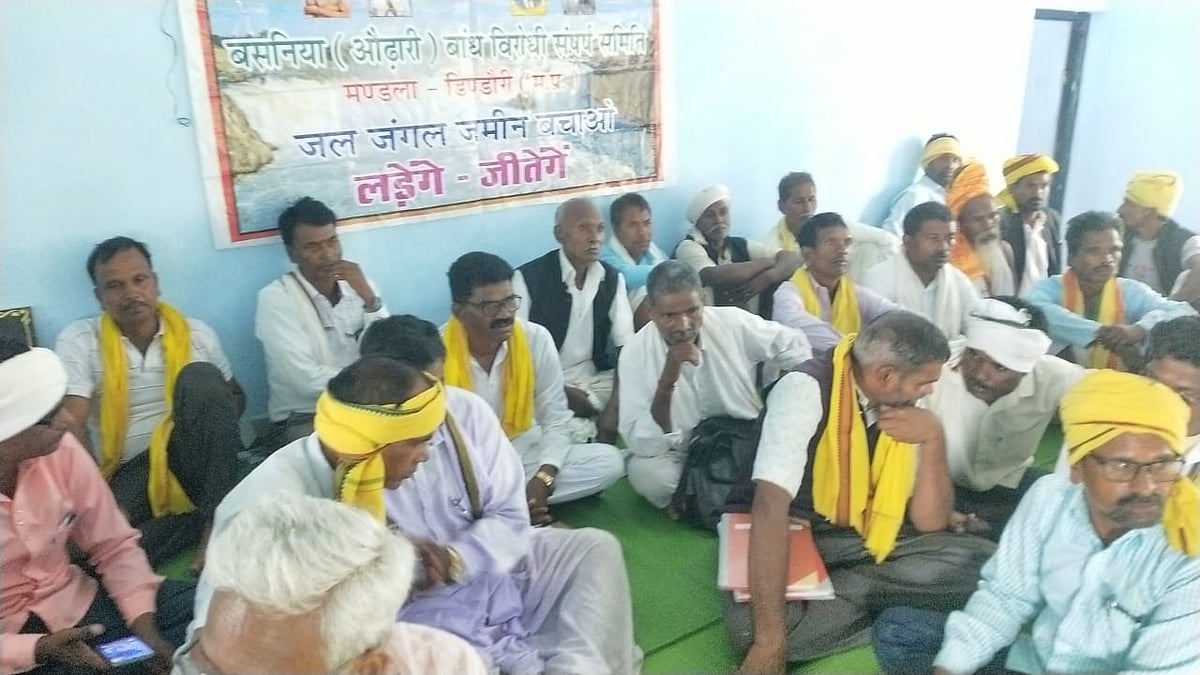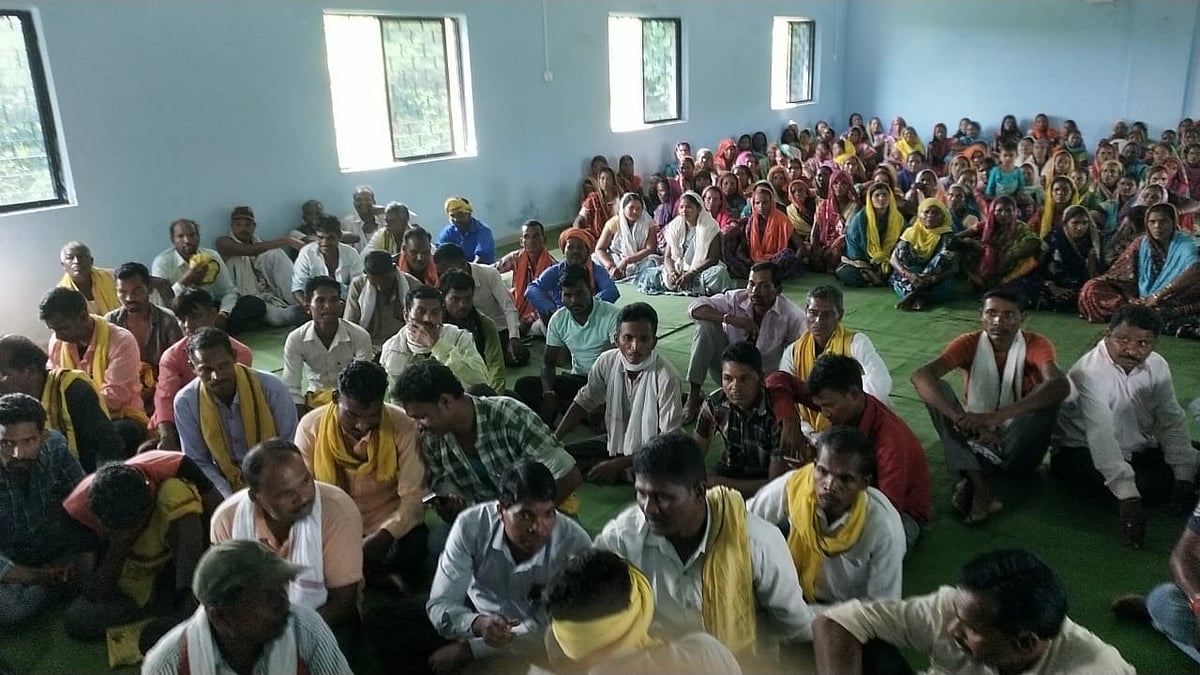Madhya Pradesh polls: A dam to block the tribal vote?
They call it ‘inclusive development’, but the BJP’s promise of a fulsome share of the treasury holds little water for the 31 villages to be submerged by the Basania Dam project

Union home minister Amit Shah, here in Mandla, Madhya Pradesh, to launch the Jan Ashirwad Yatra on behalf of the BJP on Tuesday, 5 September, certainly had a lot to say.
He seemed unaware, however—or perhaps refused to take cognizance—of a large gathering of the tribal communities from 31 villages, who held a meeting in the same district just a day before his visit.
That meeting sounds a warning bell for the Bharatiya Janata Party in Madhya Pradesh.
Shah was here to tell us that Prime Minister Narendra Modi had said that his government belongs to the tribals.
He exhorted the tribal community to decide whether it was the poor, disadvantaged tribes or the ‘minorities’ who should have first rights over the country’s riches and resources. (This rhetorical question harks back to a statement by former prime minister Manmohan Singh, who had said that the disadvantaged and the minorities have the first right upon the nation’s resources. Of course, Shah’s idea of ‘minorities’ is rather distinct from Singh’s, and is possibly a veiled nod to the Muslim community, for surely the tribal communities are also very much a minority in India.)
Shah went on to say that along with water, forest and the land that was the birthright of the tribes, Prime Minister Modi had shown them a new ‘inclusive’ path to development—a path guarded by security and respect. The BJP, he said, had honoured the tribes by making Droupadi Murmu the president of India.
Present on the dais with Shah was Union minister of state for rural development and steel Faggan Singh Kulaste, besides the chief minister and the state BJP president. Kulaste is the Lok Sabha member who was elected from Mandla district.
Kulaste hails from the Mukaskala village in Mandla. On Monday, a meeting of the tribal communities of 31 villages was held in Chakdehi village, about 16 km from Mukaskala. Half of those present were women. These villagers had gathered because the land in their villages is to be acquired for the proposed Basania Multipurpose Dam Project.


The notification had just been issued by the Mandla collector on 31 August. In it, the executive engineer of Mandla district has been entrusted with the responsibility of acquiring the requisite parcels of land. This dam is proposed to be built in village Audhari in tehsil Mohgaon of Mandla district—and will submerge 2,443 hectares of agricultural land held by 2,735 families. Curiously, all the villages that stand to be decimated by the Basania Dam project are notified areas under the Fifth Schedule of the Constitution.
Rules on administration of such areas must come as an order from the president of India herself or from the Union government, with the governor of the state the immediate authority within the state representing both.
Earlier, according to Raj Kumar Sinha of the Association of Displaced Persons and Affected Persons of Bargi Dam, near Jabalpur, the Madhya Pradesh government had on 3 September 2015 issued guidelines for the implementation of the Right to Fair Compensation and Transparency in Land Acquisition, Rehabilitation and Resettlement Act, 2013. In this notification, it is clearly stated that the consent of the gram sabha, which consists of the entire voting population of a village, will have to be obtained before any land is acquired.
But in the case of the Basania Dam project, so far no one has even talked to any tribal villager, let alone taking consent from any gram sabha. According to local media, the contract for the construction of the dam is being drawn up in favour of a Mumbai-based company.
The distance from this area to that subtending the Bargi Dam near Jabalpur is about 123 km. Going by the experience of former residents in the submergence area of the Bargi Dam, those now resident in the proposed footprint of the Basania Dam project face a future of dire hardship and uncertainty.
In the three districts straddled by the Bargi Dam project — Jabalpur, Mandla and Seoni — there were 162 villages; of these, the sites of 82 villages were completely submerged by the Bargi project. This meant the pain of displacement was visited on 12,000 people, of which an estimated 43 per cent were tribesfolk, 12 per cent were Dalits and 38 per cent were people of backward castes.
Indeed, ‘displacement’ may be the wrong term, used for lack of a better one. For most of these people still have no place to which they might have been said to be ‘dis-placed’. Uprooted, perhaps, is the more apt word? They are still landless, because the compensation they received was so small that buying land elsewhere could only be a mirage. And so, along with their farmlands were drowned any hopes of future agricultural livelihoods.
That is why the meeting held on Monday in Chakdehi village about the Basania Dam should sound an alarm bell for the BJP. Union minister Kulaste, ostensibly responsible for rural development, was specifically targeted in this meeting. The Kulaste family are considered prominent leaders in the tribal community. Apart from Kulaste, those vocal at the meeting also arraigned the various other tribal MPs of the country and the tribal MLAs of Madhya Pradesh in particular.
The tribal representatives at the meetings complained that ever since this dam was proposed, they have been writing letters to all the ministers from tribal communities themselves, have met several in person many times—but none pay them any heed. Kulaste’s indifference, in particular, has been galling especially because he is from this Mandla district himself. He should know better, surely, the angry tribal communities hold.
Given this state of things, if the BJP is expecting tribal votes out of Mandla at least, they may as well expect a rude awakening from that daydream too.
Follow us on: Facebook, Twitter, Google News, Instagram
Join our official telegram channel (@nationalherald) and stay updated with the latest headlines
